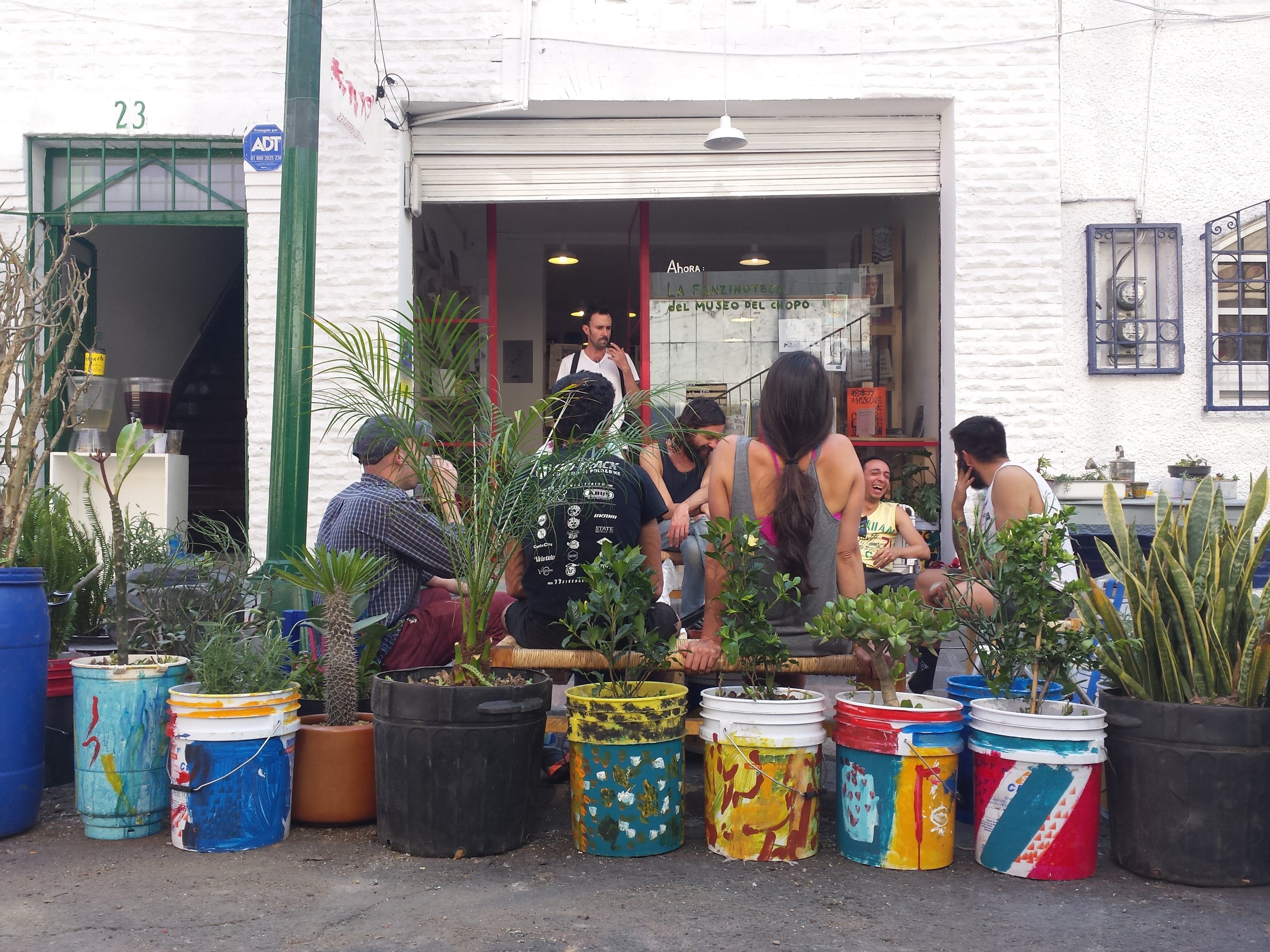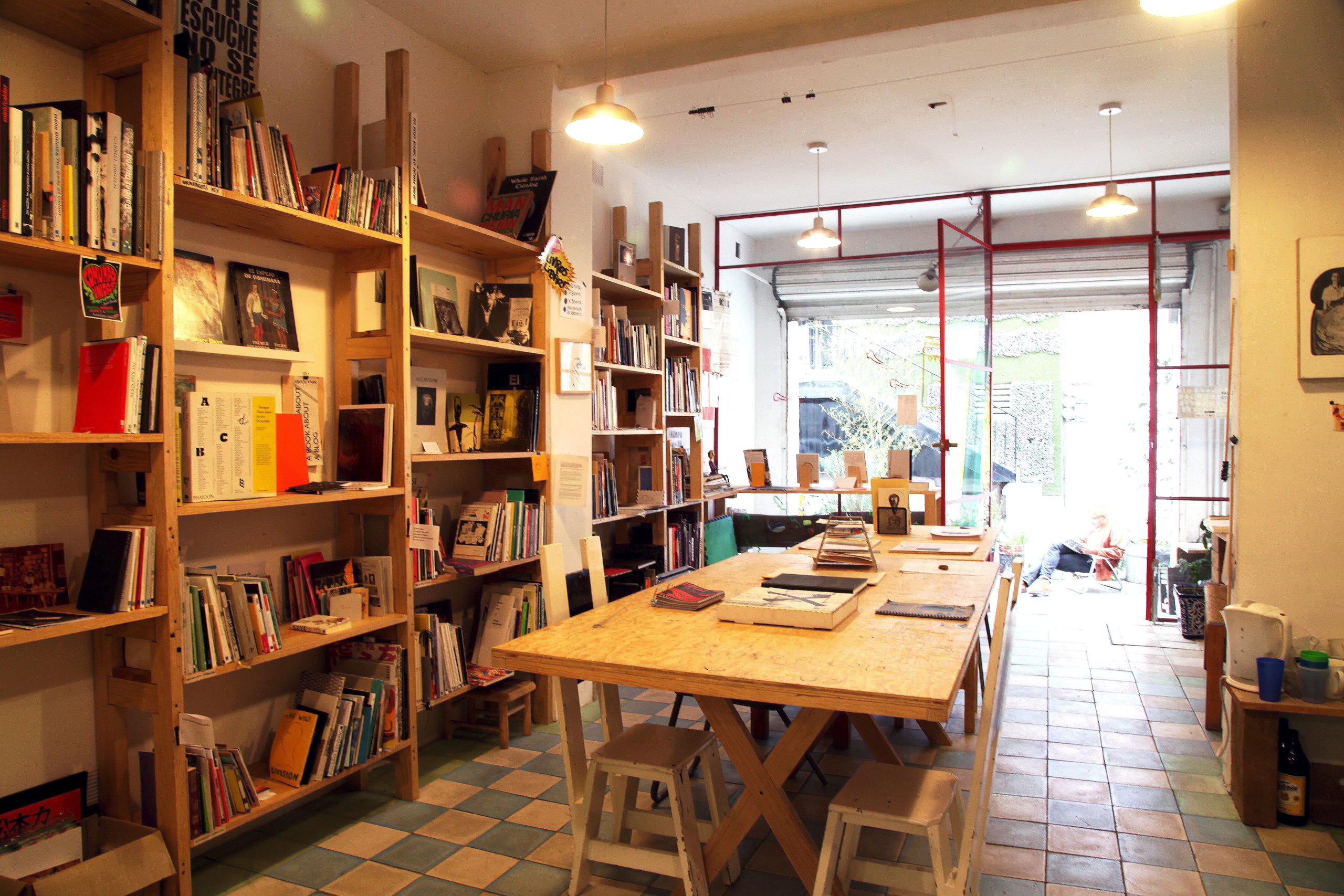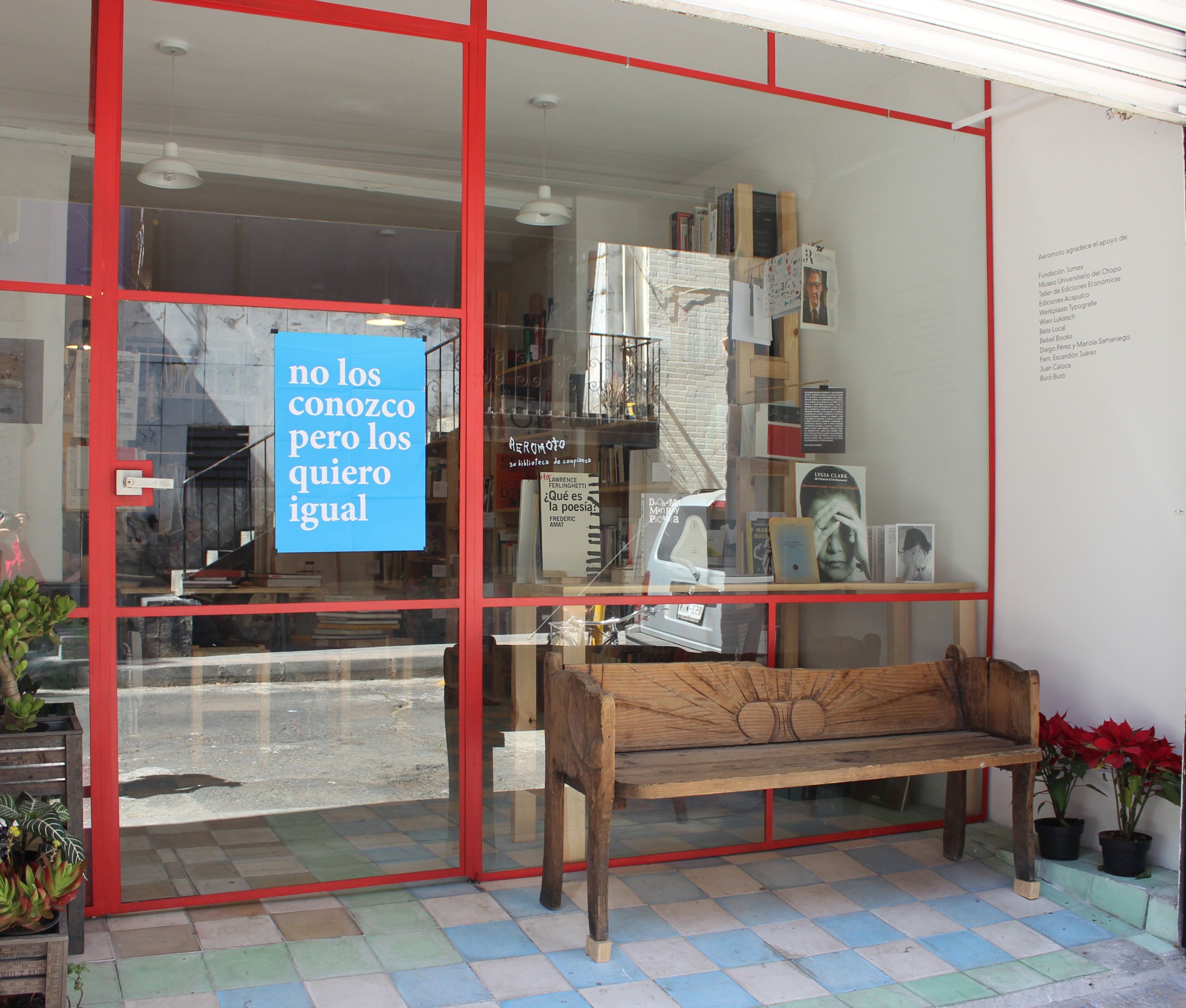Elective Affinities for the Common Good
July 19, 2025
Editorial, Mexico, Interdependence
July 19, 2025
Editorial, Mexico, Interdependence

The Insurgentes subway station is one of the main arteries in the beating heart of Mexico City. Located in the Juarez neighborhood, every month, one million people use this subway station as part of their commutes. It is where an epic battle between punks and emos took place in the early 2000s. It is one of the neighborhoods that is most affected by earthquakes. It is where the local shoe-shine guy, the lady who delivers tupperware meals to office workers, and the man who sits as a security guard in one of the many parking lots, come to work after hours-long commutes, along with thousands of others every day. It is also home to Aeromoto, or “airquake,” named after the earthquakes that shake the city, but also avant-garde Chilean poet Vicente Huidobro’s prose poem “Sky-Quake” (1931). Aeromoto started off as an idea: a lending library in a newsstand, where people who work in the neighborhood could come off the subway, borrow a book for a few hours, read it during their workday, and return it on their way back home.
But the amount of bureaucracy to open a newsstand in Mexico is staggering. So instead, Aeromoto began in 2014 as a storefront on the aptly-named Calle Venecia, which floods during the rainy season. The space initially housed the one thousand books that Maru Calva, Mauricio Marcín, Macarena Hernández, and Jerónimo Rüedi had in their shared archive. Most were about or related to contemporary art, because that’s what they were all interested in or working on. Throughout the years, however, the collection has grown. But it all started with a revolutionary question: “Why should all these books be sitting on shelves in my house if I don’t even believe in private property?” Mauricio continued: “It’s not like they’re dead books. They’re just not being used, read, opened.” Everyone else agreed: it made no sense.
To begin, Maru, Mauricio, Macarena, and Jerónimo pooled some money together and took a carpentry workshop to build shelves. The spirit was very DIY during a moment when many art spaces were sprouting around the city, so Aeromoto inserted itself in a web of affinities and interdependencies. “Slowly, our collection started growing. This was a time when many small presses were starting in the city, and we became a house for ‘books without ISBNs,’ as we called them,” recalls Macarena. “It was really great to be able to buy books that I wouldn’t have bought for myself, like some really obscure performance art books, for example. I felt like a real librarian then,” adds Maru. Most of the art schools and schools in general were lacking art-related books, so they thought this could become a resource for students as well. “We wanted all the neighbors to come. We wanted it to be a neighborhood thing,” says Maru. But when they had their official opening, only one neighbor came. “We even had free mezcal and many flavors of water,” Maru laughs.

Calle Venecia was a universe unto its own. There was a used-clothing store, so many young people would walk by. Mauricio remembers, “Silvia, our front-door neighbor was a Mexican Muslim who used to bake and sell fresh pita bread for a living. She later converted to Christianity.” “The one neighbor who came to our grand opening was an old painter. He came because he thought we could sell his paintings,” adds Maru. They all laugh as they share these stories. Their nemesis back then was Araceli, the next-door neighbor who wanted to park her car and not have people reading books and hanging out in a makeshift garden in the street. But Aeromoto wanted to occupy public space, “to practice the commons.” “We were anti-object. We didn’t want to become an exhibition space. We only wanted books, printed matter. And nothing was for sale, ever,” explains Mauricio. Not even the enthusiastic neighbor’s paintings.
Friendship has been ever-present in everything that happens at Aeromoto. It all started with a group of friends, and the events were organized from an ever-expanding circle of friendships. Hanging out and making it a space for pleasure is at the core of Aeromoto. Maru, Mauricio, Macarena, and Jerónimo dedicate special care to the relationships that come from affection, and the affection that flows from new friendships. Aeromoto is also a space for play, expanding the definition of what a public art library can be and what our relationship with books can mean. Humor and spontaneity have guided them through years of fluctuating sources of income. Aeromoto has been self-funded, sought public grants, asked people to pay around fifteen dollars to become members for a year (half if you’re a student), and sold old donated atlases at the neighborhood second-hand bookstore to pay for office supplies. Everything is creatively solved. If they need pots for plants, they invite a friend to do a pottery workshop. The reading garden was made together with about three dozen people, old and young. From the very beginning, the idea was to make Aeromoto a space to do things that didn’t rely on buying things. “We also wanted to celebrate the handmade, different crafts, and making things ourselves with what’s at hand,” Maru explains.
Slowly, Aeromoto became an oasis in the busy neighborhood. When I first visited back in 2015, the first thing I noticed was the plants on the street that delineated a small perimeter (where, if one were like Araceli, one might be tempted to park one’s car), and a few chairs to sit in. At some point, someone took Aeromoto’s founding disdain for private property to heart and “liberated” their garden chairs. But even misfortune was taken in stride and with good humor. More chairs soon reappeared. The whole thing felt like a situationist prank, a haven for idleness and leisure.
Back then, the space was very unusual. Although plants and chairs outside have now become common in Mexico City after the pandemic, they work in the opposite way as Aeromoto’s reading garden: restaurants have privatized public space, while Aeromoto morphed and occupied it. That first day I visited, I entered the garage-like space and noticed how cozy it felt with large reading tables, ideal for communal activities. There were posters on the walls, including one that stated “At Aeromoto nothing is for sale.” Another one read “Something wonderful is happening.” And books were everywhere. It was my idea of paradise. I ended up there through friendship: a friend of mine invited me to curate a selection of books from their collection, and also to bring some books of my own to lend. So I walked in, carrying a heavy load of books, some of which would stay there as donations, and others which would be a part of that month’s “book table” selection. I was part of an independent collective press, and thanks to that invitation, Aeromoto now has a complete collection of all of our books.
They invited all kinds of people to do things, and all sorts of people came and proposed events. During “Infinite Pedagogies,” people would choose indispensable books for the library to buy with grant money. This was so moving to artist Abraham Cruzvillegas that he decided to sponsor a whole new “infinite pedagogy” section. In the stridentist trunk series, a library-goer and enthusiast who was an expert on the stridentist movement brought books, masks (now property of the Reina Sofía Museum), and stridentist paraphernalia. During “ethylic poetry” sessions, people would read poetry and get wasted on themed alcoholic beverages (caipirinhas while reading Brazilian concrete poetry; absinthe while reading the French accursed poets, and so on). Events called “Beauty Salons” featured people reading each other’s poetry in translation (now memorialized in a recently published bilingual anthology). There were also performances, printing workshops, presentations, punk concerts, experimental drawing sessions based on books from the collection, reading groups, study groups, activist circles, etc. There was anything and everything that would expand the definition of a public library.
Aeromoto has also changed and adapted over the years as its founders changed and their interests expanded. When Mau, Maru, and Macarena had children, they felt like they didn’t want to give up the time they have spent building community. So, their friend Paola Santoscoy, who was also a new mother, curated a series of “books to be read while breastfeeding”: books that are small and light enough to hold with one hand. “Aeromoto was a comfort for me as a new mom,” continues Maru. Everyone nods in agreement as they share how the space shifted, matured, and grew with them. There was mask-making for carnival and workshops for little ones. Pleasure and play continue to be the heart of the space. And so, no matter if it was twelve in the afternoon or late at night, there was always something going on. There was always coffee, tea, or a cold beer. There was always the possibility of an encounter.
At one point, the four friends decided they should hold a contest for Aeromoto to have a flag, to serve as a publicly visible indicator that “something is happening.” They held an open call, and the winning proposal was a koinobori, a flag shaped like a blue koi fish. The flag flew for a short time before the pandemic hit, during which time Aeromoto, like too many spaces, had to move out. As with every other time that things got hard and everyone was about to give up, someone would show up either with enough money or a new idea to keep things going. This time, Carolina Coppel and Catalina Urtubey, two friends and patrons, proposed to move Aeromoto to the second story of a seventeenth-century house right next to the Templo Mayor pyramid and museum on Seminario Street, in the heart of downtown Mexico City.

Anyone who has ever had to move with books knows what a pain this can be, but moving wasn’t as terrifying as expected because one of Aeromoto’s favorite activities is cataloging. The four friends came up with crazy categories like “books about books,” “Los claveles” (which plays on the word “clavel,” a pun on carnations but also people who are very deep into something), “water-damaged books,” and “revolutionaries,” to mention a few.
If there were already ghosts moving books out of their shelves and having fun at Aeromoto back on Venecia Street, their new location would prove to be an ideal haunt for the undead, the alive, and all kinds of spirits—for a couple of years anyway, before the rent would go up and Aeromoto would once again have to move, now to the San Miguel Chapultepec neighborhood, near the park. The book collection patiently awaits cataloging and reshelving at an artist-run space called Castillo de Chapultepec, which is run by longtime Aeromoto friends Willy González and Rodrigo Escandón. “Aeromoto is like quicksilver,” the four founders say. It can separate into little parts or join back together into a whole. And so once more, friendship is what binds Aeromoto together, keeps it afloat, and continuing to shake the Mexico City airwaves.
Interdependence (2022–2025) is a collaboration between e-flux Architecture and OtherNetwork.